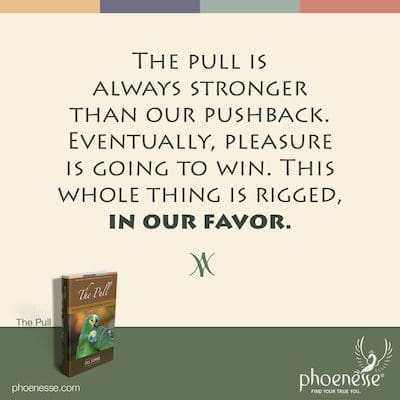There is a feature in the human personality related to the pull that we tend to trot out on Opposite Day: it’s called frustration. Like so many human attitudes, it can go in a couple of erroneous and conflicting directions, and neither is good. Because if one extreme is wrong, moving toward the opposite extreme is never the solution.

So neither of the frustrating alternatives of denouncing happiness or intensely making rigid demands is going to ring the winning bell. In fact, our wrong attitude about frustration lures us down a dark, harmful alley that impairs relationships, self-respect and inner peace. Wah, wah, wah.
Let’s link up frustration with the pleasure principle, that innate inner desire we all have to strive towards life, pleasure and wholeness. We need to go back to babyhood to sort this one out, because that is where this all begins. Babies are hardwired to strive for pleasure. But they aren’t capable of tolerating any frustration—which is what humans experience when gratification is delayed—because they have zero awareness that there is a future.
If the baby psyche doesn’t mature, it will get stuck in this frustrating attitude of “I want it now.” From here we enter into an apparent contradiction: the less we can endure frustration, the less we can have pleasure. So, for example, when we rigidly insist on something, we lose the pleasure we were shooting for. Because either the act of our striving—typically by way of a forcing current—will make it impossible to get what we want, or when we do succeed, our nutted-up inner state will prevent us from enjoying it. Bloody hell. Can we not get a break here?
The fact of the matter is this: for real pleasure to be felt, we’ve got to have a relaxed inner state. With the benefit of a flexible inner climate, we’ll produce a positive, life-affirming attitude that includes all of reality—both the goody-I-got-my-way and the oh-well-not-this-time versions. But if we rebel against any delay in gratification, we’ll end up angry, tense and stubborn—real doggie downers for tapping into life’s pleasure stream.
Here’s the great error in all of this: we believe that what we want is more important and more capable of giving us pleasure than having a peaceful state of mind. So we totally misunderstand the importance of being able to tolerate frustration. We then jump to unhelpful responses like martyrdom, abstinence and resignation, putting on a mask of “spirituality” that makes pleasure out-and-out impossible. What does arise is a feeling of hopelessness. What a waste.
For human beings, pleasure is not optional. It will come to us either through genuinely pleasurable channels or by way of distorted, negative avenues. It’s a byproduct of being in the cosmic stream and can’t possibly be considered unimportant. But insisting on it with a do-or-die attitude that can’t tolerate even a wee bit of frustration is out-and-out erroneous.
So what’s the way out? We know there’s got be an off-ramp if we look for it. And here it is: we’ve got to learn to let go. We’ve got to allow ourselves to postpone having our own way, but without giving up on the possibility of fulfillment. Then and only then will we create the right inner climate for the cosmic flow to stream forth. We’ve got to learn to chill, people.
Climb down off the ceiling. Letting go and relaxing is not the same as relinquishing forever. We’re talking about the subtle but strong power of gently letting go. We can relax right into pleasure. This may sound obscure if we’ve not felt this before, maybe even contradictory. But once we’ve had an inkling of this, we’ll grasp the power of this concept and want to learn to use it deliberately.
We can apply this to just about anything—to big wishes and little ones. All it takes is an awareness of an inner tension and a willingness to relax into an attitude of wise, positive reasonableness. Oh, and humility. It takes some of that too. We want to keep on seeking fulfillment, but without hanging onto it for dear life.
Here’s the thing: anger and self-pity can feel pretty darned good. They are energizing, even if unpleasant, and can therefore be a nice substitute for satisfaction. So there’s a great temptation to remain tense. Ego, are you listening? You’ve got a job to do here. Yes, the ego must make it its business to constructively let go. A tiny point of effort is all we’re asking for here.
Once the ego gets the ball rolling, it’s all downhill from there. The ego will get carried along by the inner forces it activates through the letting-go process. Abandon the tension and the pleasure will appear. The flexibility of relaxing into what is—even if what is happening at the moment isn’t what we want—will ultimately bring us what we want.
First, this is going to give us a good feeling about ourselves. Maturity feels good. And it puts us in harmony with the cosmic stream that runs through our system. So sooner or later, that thing we want will come. It can’t not come. Everything, in the end, follows the law of cause and effect. We can count on it.
We can work towards establishing an inner knowledge of this truth: all fulfillment is potentially ours. Our knowing this will make it so. But we need to know this in a relaxed atmosphere that lets go, so our wishes can come true. The state of “I must have it” is not it. In that climate, little can materialize. It’s like hostile territory to harmony, which is what’s needed for fulfillment.
Tension and resignation are two sides of the same coin. Look for one, realize the other is also there, and then consciously reach for the soothing balm of letting go. It’s just like relaxing into the pleasure of giving up separation. Yet we fight, tooth and nail, in not wanting to give this up, frustrating ourselves on the most important level of living.
We are fighting against our own best interest on this. The more we resist the pull towards union, the more we fear we’ll never get it—and the ensuing tension makes us incapable of hanging out in the frustration caused by our own cross-currents. Little by little, we need to remove these blocks that tie us up in knots.
The destiny of the cosmic pull is to love, in all its flavors and varieties. It pulls us towards a loving partnership with another person. And it pulls us toward an expression of our God-given sexuality. It pulls us to integrate all this with our thoughts and ideas, accepting all of life, including ourselves and others.
But love can only grow where there is no fear. So if we fear coming into contact with others, we put up defenses that produce hurt and anger. Now contact feels like pain. That’s called negative pleasure. Not so much love. For that, we need to learn to trust the benign nature of life.
We can apply this to so many areas of our lives. Many of us have a fear of failure, which must be tied, on the flip side, to a fear of success. Like any happiness, success seems vaguely dangerous. It’s like a minor happiness that we actually fear just as much as a major happiness, like love. When we fear something, we block it. So then we flip over to fearing not getting it. Then we can’t stand the feeling of emptiness, so we battle against feeling frustrated. We pitch a hissy fit and demand instant gratification, in essence screaming, “I want to feel good and be happy. But I won’t trust the universe and let go.” Responds the universe: “We’re on your side, but you make things utterly impossible.”
Don’t forget: the pull is always stronger than our pushback. Eventually, pleasure is going to win. This whole thing is rigged—in our favor. There is nothing to fear in getting to know the machinations of our innermost selves. Running away from this is the real tragedy. The running and hiding is the cause of our pain. There is nothing whatsoever to fear about what we may discover. The more we uncover, the better equipped we’ll be to establish contact with others, and the more we’ll be able to feel and follow the cosmic pull towards love.
Return to The Pull Contents
Read Original Pathwork® Lecture: #149 Cosmic Pull Toward Union – Frustration



